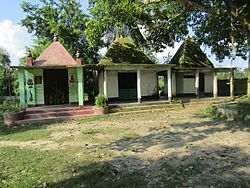Badarganj Upazila: Difference between revisions
No edit summary Tags: Mobile edit Mobile web edit |
No edit summary Tags: Visual edit Mobile edit Mobile web edit Advanced mobile edit |
||
| Line 91: | Line 91: | ||
==Administration== |
==Administration== |
||
'''[[Upazila Nirbahi Officer|UNO]]''': Md. Nazir Hossain.<ref>{{Cite web |title=Badargonj UNO |url=https://badargonj.rangpur.gov.bd/en/site/officer_list/%E0%A6%AE%E0%A7%8B%E0%A6%83-%E0%A6%A8%E0%A6%BE%E0%A6%9C%E0%A6%BF%E0%A6%B0-%E0%A6%B9%E0%A7%8B%E0%A6%B8%E0%A7%87%E0%A6%A8 |access-date=2024-08-27 |website=badargonj.rangpur.gov.bd}}</ref> |
|||
Badarganj was made a thana in 1905 and was turned into an upazila in 1983.<ref name="Banglapedia">{{citation |
Badarganj was made a thana in 1905 and was turned into an upazila in 1983.<ref name="Banglapedia">{{citation |
||
|chapter-url=http://en.banglapedia.org/index.php?title=Badarganj_Upazila |
|chapter-url=http://en.banglapedia.org/index.php?title=Badarganj_Upazila |
||
Revision as of 04:25, 27 August 2024
Badarganj
বদরগঞ্জ | |
|---|---|
 Laldighi Temple | |
 | |
| Coordinates: 25°40′N 89°03′E / 25.667°N 89.050°E | |
| Country | |
| Division | Rangpur |
| District | Rangpur |
| Area | |
• Total | 301.28 km2 (116.32 sq mi) |
| Population (2011) | |
• Total | 287,746 |
| • Density | 960/km2 (2,500/sq mi) |
| Time zone | UTC+6 (BST) |
| Website | Official Map of Badarganj |
Badarganj (Template:Lang-bn) is an Upazila of Rangpur District in the Division of Rangpur, Bangladesh.
History
Legend has it that Badarganj is named after the mystic-saint Hazrat Badaruddin Shah.[1] His tomb is situated in the middle of the town.
After the conquests of Bengal, Turk Commander Ikhtiyar Uddin Muhammad bin Bakhtiyar Khilji stopped over at a field at Mansinghapur, Madai Khamar during his invasion of Tibet in 1203 AD to feed his horses.[1] After that event, the field is named 'Bakhtiyar Danga'.
At Jharuar Beel and Padmapukur, mass killing occurred during the liberation war of Bangladesh.[1]
Geography
Badarganj is located at 25°40′N 89°03′E / 25.667°N 89.050°E. It has a total area 301.28 km2. It is surrounded by Taraganj Upazila, Rangpur Sadar Upazila and Saidpur Upazila on the north, Nawabganj Upazila on the south, Rangpur Sadar Upazila and Mithapukur Upazilas on the east, Parbatipur Upazila on the west.
Rivers and depressions
Jamuneshwari, Chirnai, Katgara and Chikli are main rivers that run through Badarganj. Bhelakoba, Nandair, Chaprar, Haribhanga beels are main depressions.
Demographics
| Year | Pop. (000) | ±% |
|---|---|---|
| 1981 | 179 | — |
| 1991 | 213 | +19.0% |
| 2001 | 258 | +21.1% |
| 2011 | 288 | +11.6% |
| 2022 | 315 | +9.4% |
| Source: Bangladesh Bureau of Statistics[2] | ||
According to the 2011 Bangladesh census, Badarganj Upazila had 71,982 households and a population of 287,746. 68,423 (23.78%) were under 10 years of age. Badarganj had a literacy rate (age 7 and over) of 42.99%, compared to the national average of 51.8%, and a sex ratio of 995 females per 1000 males. 25,286 (8.79%) lived in urban areas.[2] Ethnic population was 3,164 (1.10%), of which Santal were 1,556 and Oraon 1,307.[3]
As of the 1991 Bangladesh census, Badarganj has a population of 213431. Males constitute are 51.28% of the population, and females 48.72%. This Upazila's eighteen up population is 109320. Badarganj has an average literacy rate of 23.9% (7+ years), and the national average of 32.4% literate.[4]
Economy
Badarganj is well known for the production of shataranchi (a kind of tapestry).[1] Among other cottage industries of the upazila are bamboo work 159, weaving 15, goldsmith 8, blacksmith 12, potteries 20, wood work 40, tailoring 30, bidi 70.
Points of interest
Among Archaeological heritage and relics are Nine-domed Mosque at Lal Dighir Par of Radhanagar union, tomb of Kutub Shah at Kutubpur union, Bakhtyar Danga, Vhim Garh at Mansinghapur, Madai Khamar, Zamindar Bari at Dilalpur.[1]
Administration
Badarganj was made a thana in 1905 and was turned into an upazila in 1983.[1]
Badarganj Upazila is divided into Badarganj Municipality and ten union parishads: Bishnupur, Damodarpur, Gopalpur, Gopinathpur, Kalupara, Kutubpur, Lohanipara, Madhupur, Radhanagar, and Ramnathpur. The union parishads are subdivided into 64 mauzas and 120 villages.[2]
Health centres include Upazila health complex 1, union health and family welfare centre 10, health centre 1. Religious institutions Mosque 315, temple 32, church 6, sacred place 1. There are above hats, bazars and fairs Total in Badarganj. The most noted hats and bazars are Badarganj, Laldighi, Kutubpur, Bagmara, Faridpur, Bakshmiganj, Bagarganj, Mominpur hat; noted fairs are Badarganj fair, Pirpal (Laldighi) Fair, Bakshmiganj and Badarganj fair.[1] BRAC, ASA, Grameen bank, RDRS, Seba, Grambikash are active NGOs in Badarganj.
See also
References
- ^ a b c d e f g Abdus Sattar, "Badarganj Upazila", Banglapedia
- ^ a b c d "Bangladesh Population and Housing Census 2011 Zila Report – Rangpur" (PDF). bbs.gov.bd. Bangladesh Bureau of Statistics.
- ^ "Community Tables: Rangpur district" (PDF). bbs.gov.bd. Bangladesh Bureau of Statistics. 2011.
- ^ "Population Census Wing, BBS". Archived from the original on 27 March 2005. Retrieved 10 November 2006.
- ^ "Badargonj UNO". badargonj.rangpur.gov.bd. Retrieved 27 August 2024.

